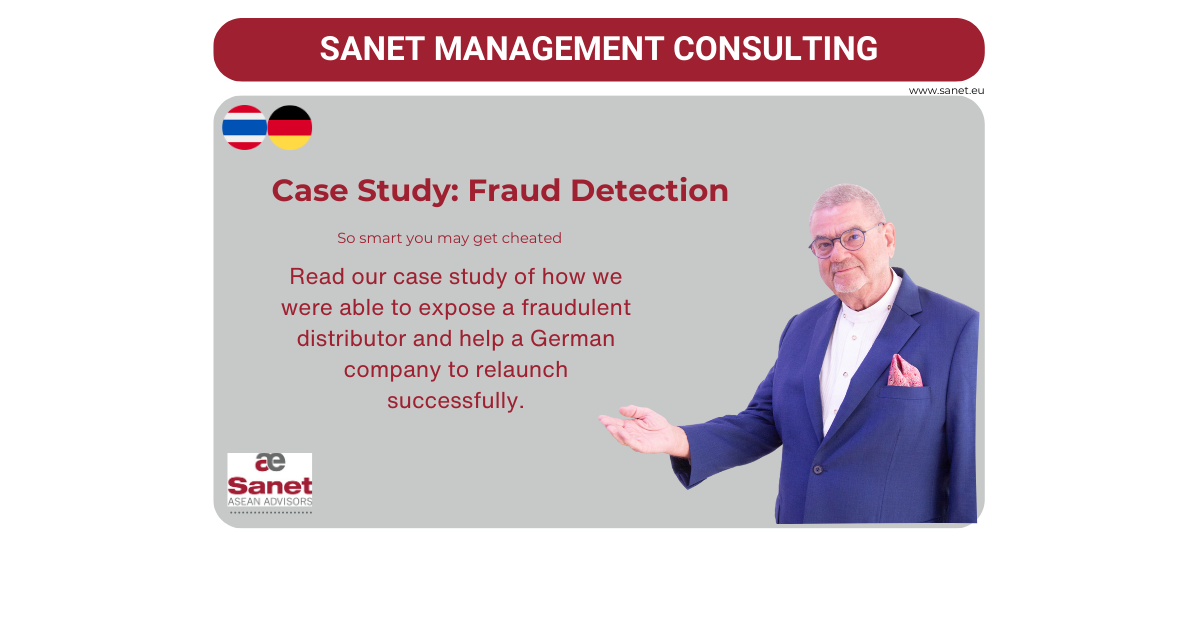The initial situation
For years, our client’s unsatisfactory market share had been the subject of discussion and root cause analysis. Although the market was vast, and both purchase and sales prices were suitable, only a very small market share was achieved. The suspicion was obvious: there was some fraud by the sales partner.
The facts:
A German company from Baden-Württemberg produced highly specialized components for injection molding equipment*. With its sophisticated products, the company had a global market share of 14%.
In Thailand, however, where there were 1,700 Tier 1 and Tier 2 suppliers in the automotive industry, the company struggled to reach a market share of 3%.
For years, they had worked in mutual exclusivity with a Thai partner, let’s call him TRICKY LTD, who was very well connected in the industry. It was managed by a Chinese sales manager of our client from Hong Kong, who had been working for the company for many years and enjoyed the personal trust of the owner.
For years, the unsatisfactory market share had been the subject of discussion and root cause analysis. The prices of the German manufacturer to the partner were already at the profit limit.
Then TRICKY LTD. opened its calculation and pricing. But this did not help either. The margin TRICKY LTD. earned from its major customers was fair and not excessive.
The management consultants of SANET ASEAN ADVISORS were commissioned to determine the cause of the weak market position.
On the surface, the partner was also willing to support us in finding the cause.
The approach
Initially, we involved well-prepared Thai employees in the project, who very quickly found a sound personal basis for discussion with the sales company.
First, we were looking for sales weaknesses of the partner. We did not want to assume from the outset that the sales partner was untruthful.
It turned out that there were indeed deficiencies here. The head of TRICKY LTD. wanted to keep costs low and paid his sales team poorly. Moreover, they were hardly admitted to any necessary trainings.
The result was high fluctuation and lack of competence in the team. Almost everything depended on the boss, who, however, did not take up some technical advancements and did not even understand them.
Nevertheless, this alone could not explain the dramatically poor market share.
We were then allowed to have a look at the books of TRICKY LTD. and to discuss them with the owner’s wife, who was responsible for the finances.
This required a special level of trust that the German Sanet management would naturally have found difficult to achieve, if only because of its “control function”.
Well-prepared Thai employees were therefore brought into the project in a targeted manner and very quickly found a suitable basis for personal discussion.
What they soon noticed was the financial situation: While TRICKY LTD. had hardly any fixed assets, the owners nevertheless lived “on a large scale”. They resided in a luxurious villa in a prime downtown location, drove a Mercedes S-Class and proudly reported about their two children, who studied at the most expensive US universities.
Of course, they also owned the company building, for which they collected excellent rent from TRICKY LTD.
The exclusive partner allegedly had no other income than the sales of the products of the German principal. So how had this handsome fortune come about?
Trailing the trick
Now we took a look at the partner’s largest customers. Sanet’s attorneys obtained financial information about the customers from the Department of Commerce, and our team investigated their lines of business.
Because Sanet had experience from numerous distributor searches, they knew exactly what to look for when it came to fraud by sales partners.
And we found the first traces. Some of the major customers in Thailand had shareholders or directors who, judging by their names, were obviously related to the importer’s management.
That was suspicious. However, the prices they paid TRICKY LTD were calculated normally. So what was going on?
When our technical management visited two of these plants under a pretense, they were very surprised. None of our client’s technical plants had any use for the materials or components of our client and TRICKY LTD.
The suspicion was obvious: two of the biggest customers were actually not customers at all, but possibly only middlemen who shared a TOP additional margin with the distributor.
Meanwhile, the boss of TRICKY LTD. had found trust with the Thai Sanet employees. They often chatted about how stupid foreign managers were and how easy it was to trick them.
And then the boss herself opened the “Pandora’s box”: Two of the biggest customers of TRICKY LTD. were actually not customers at all, but middlemen. They sold to them at normal conditions, but then the latter doubled the price and sold the goods on to customers who were technically particularly dependent on the quality of the German manufacturer.
The system figured out
With this, everything fell into place: TRICKY LTD. bought the goods at a favorable price, sold them with a narrow margin to the “relatives”. The latter, in turn, sold to the market at a hefty 100% markup.
That extra margin was shared. The family used it to finance houses, cars and studies.
However, with such a price situation, the market share naturally remained very low. Only top companies could afford the high prices for their production.
But that was not enough. Customers who did not necessarily need our client’s high-priced products were served with cheap components from China, contrary to the exclusivity agreement. And again through joint companies with which TRICKY LTD. formally had nothing to do. This revenue also went into the pocket of the family clan.
Thus they additionally cannibalized the sales of the German manufacturer.
The accomplice in the own organization
A particular disappointment for our client was that the Asian sales manager from Hong Kong was involved in the deception by the sales partner.
He was kept quiet with handsome payments and closed both eyes to the fraud.
During the process, he even tried to misdirect Sanet’s research by providing false information and fabricating false spurs.
A suspicion expressed early on by Sanet was initially vigorously denied by our client.
The outcome
At first, however, Sanet was almost like “HIOB”, the messenger of bad news.
Some internal managers from the company, who were actually there precisely to prevent such developments, doubted the result until it was all clearly proven.
But then things happened fast: first, TRICKY LTD’s end costumers were identified so that they in future could be approached directly. Then the management followed Sanet’s advice:
-
- A face-saving agreement was reached with the owners of TRICKY LTD.
- A Company Ltd. under BOI promotion was established,
- Sanet recruited a qualified managing director
and since then, sales, market share and income from the Thailand business have been increasing as anticipated.
After that, a pricing policy and a marketing package were presented that had to be attractive to major distributors.
Furthermore, a sales plan was prepared, which not only included the TOP 10 potential distributors, but also identified a large number of new customers customers for these new partners.
* Names and company related information were changed and anonymized to ensure confidentiality to our client.

